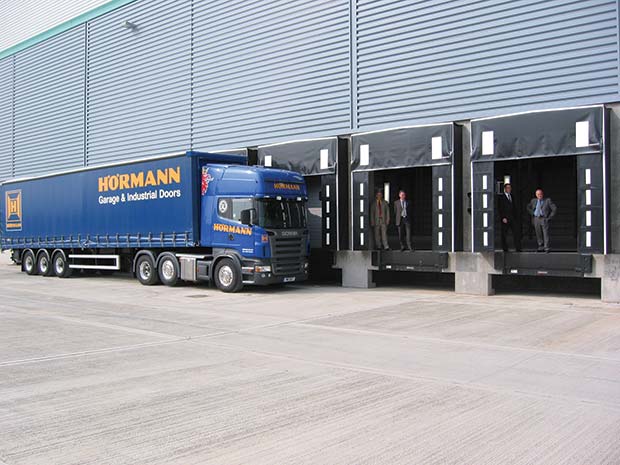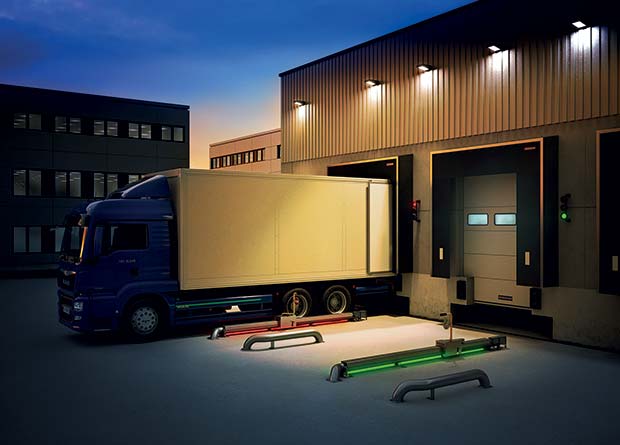Alan Jenkins speaks exclusively to Warehouse & Logistics News about how the UK industrial door industry has developed over the years.

Sales Director, Hörmann UK
Alan Jenkins, Sales Director of Hörmann UK, is retiring at the end of April, leaving his role with the garage and industrial door manufacturer. In this interview with Warehouse & Logistics News, Alan looks back over his career, in which he has headed up sales for Hörmann UK, led its work for customers across the different industry sectors, and played a major part in the development of its products and solutions.
Alan first made his reputation in industrial doors and loading bays when he set up Stertil’s UK operation, before going on to spend the next 13 years with Hörmann. Looking back, Alan says his proudest moment at Hörmann was establishing an industrial door division. He achieved this by merging two of Hörmann’s acquired sales subsidiaries in the UK, Seuster and DynaSeal. Both Seuster and DynaSeal produced fast action doors and loading bay equipment, a product area the group wasn’t previously active in.
Alan’s prime focus over the years has been on industrial doors, concentrating particularly on the warehousing and logistics sector. As part of his job, Alan has been, and still is, actively involved in various industry bodies and trade associations. As WLN readers will know, Alan is currently Chairman of the Industrial Group of the Door & Hardware Federation and Hörmann are committed members of UKWA.
These involvements help Hörmann keep abreast of the latest developments. A major one is the rapidly evolving field of on-line retailing, which is putting pressure on the warehousing and logistics industry to work with retailers to deliver customer service, as Alan confirms:
“The concept of intra-logistics as an all-embracing philosophy is transforming how warehouse operators use warehouse equipment and IT solutions to move goods and related data around their sites. It is delivering efficiency and cost effectiveness, particularly in handling internet purchases and dealing with returns.”
Alan notes that responding to such changes has helped make the door industry much more flexible in how it deals with clients. There have also been other significant developments over the period. Among them, the EU Machinery Directive has been instrumental in raising construction material and engineering values. There’s still room for a great deal of interpretation in the directive, as Alan acknowledges, but nevertheless Hörmann and others have been pushing the industry for compliance. A second major development Alan cites is the adoption of ‘U’ value insulation measurements. In Scotland, where the weather can be extreme, achieving ‘U’ values of 1.5 on buildings is of paramount importance, as the climate puts the spotlight on the speed of door operation and keeping doors closed most of the time.
 Another factor Alan says has come into prominence in his time is the measurement of carbon content in door and loading bay products, commonly referred to as it’s carbon footprint. This is established by taking into consideration the amount of carbon that is used in the manufacturing process, how efficient the product is when using minimal amount of energy, the temperatures required to maintain it and, most importantly, whether it is recyclable at the end of its life. All Hörmann door products come with an Environmental Protection Declaration (EPD).
Another factor Alan says has come into prominence in his time is the measurement of carbon content in door and loading bay products, commonly referred to as it’s carbon footprint. This is established by taking into consideration the amount of carbon that is used in the manufacturing process, how efficient the product is when using minimal amount of energy, the temperatures required to maintain it and, most importantly, whether it is recyclable at the end of its life. All Hörmann door products come with an Environmental Protection Declaration (EPD).
A further area of product information that has grown during Alan’s time is building information modelling (BIM). The implementation of BIM technology has put pressure on Hörmann, as well as other suppliers of industrial building products, to make full product data accessible to architects, specifiers, and developers. Alan was closely involved in the process of ensuring Hörmann’s products are BIM Level 2 compliant. The benefit of introducing BIM into the design and construction stage helps assist the building owner or FM company know exactly what products were installed in the building, the date they were installed, the colours, as well as any warranty information.
At the outset, Alan says, door manufacturers were told they would have to work to BIM Level 2 by June 2016 if they were working on projects in the MOD, NHS or other government funded projects. This does not seem to be the case, as over the last few years, many companies have been ignoring these deadlines. Meanwhile, UK house builders and warehouse developers are driving compliance to this standard.
Alan has been personally involved in many of Hörmann’s major contracts over the years but sees his biggest achievement being their work for Prologis, supplying 40 UK sites. He goes on to say: “For many years Hörmann has worked closely with Prologis, and one of the major challenges has been keeping ahead of the game and future-proofing installations. Loading bays need to be adaptable to cope with unexpected changes, like the arrival of doubledeck trailers.”
 As with other members of the Hörmann management team, training has been another focus for Alan at Hörmann, as he confirms: “We have developed comprehensive training for service engineers and mates, and actively offer the same training to our trade partners in the Industry.” Alan, in his role as Chairman of the Industrial Door Group at the Door and Hardware Federation, was instrumental, along with other DHF members, in developing the Industrial Door training Diploma, which has been actively subscribed to by Industrial Door companies and FM companies. Technical developments within the Hörmann group generally originate in their home country, Germany.
As with other members of the Hörmann management team, training has been another focus for Alan at Hörmann, as he confirms: “We have developed comprehensive training for service engineers and mates, and actively offer the same training to our trade partners in the Industry.” Alan, in his role as Chairman of the Industrial Door Group at the Door and Hardware Federation, was instrumental, along with other DHF members, in developing the Industrial Door training Diploma, which has been actively subscribed to by Industrial Door companies and FM companies. Technical developments within the Hörmann group generally originate in their home country, Germany.
Directors of overseas subsidiaries do, however, make proposals for product enhancements, many of which have found their way into improved models. Alan has been very much involved in the development of sales of the Fast Action Spiral Door, introduced in the last five years. Alan commented: “Normal high speed doors have virtually no inherent insulation value and give no break from the elements. We’ve been involved with PU foam filled doors and roller shutters for many years. With their emphasis on improved thermal efficiency, the payback through energy savings is far quicker than with standard non-insulated products.”
The electronic controls division has also seen major advances during Alan’s time, with increased emphasis on home controls and more expected of remote controls. On the industrial doors side, Hörmann’s fast action doors interact with automated pallet handling technology and building management systems. In their loading bay installations, Hörmann frequently install docks and work with the main contractors. The average installation 20 years ago was 25 bays per site, with a couple of level entry doors. Now, Alan says, the average requirement is 60-80 bays and with various internal and external doors.
Hörmann’s involvement with loading bay projects has also led to the company developing the MWB Wheelblocker, a piece of safety equipment that locks lorries into the loading bay and allows loading bay workers to manually lock trucks and trailers in place so they can’t move until the process is complete. A previous version of the Wheelblocker was first produced some time ago at DynaSeal, which is now part of Hörmann. Alan says: “Major clients like Nestlé and Asda insist on having these devices as part of their loading bay solutions. The MWB Wheelblocker is our offering for enhanced safety and it allows 3PL’s and building owners to achieve a safe working practice within their site risk assessment and operational method statements.”
Alan Jenkins retires from Hörmann at a time when the family-owned company is growing both organically and through acquisition. Recent purchases include Huga and Tortec, manufacturers of products related to the doors that are at the core of Hörmann’s business.
There is no getting away from Brexit when you talk to senior managers of industrial companies. The only effect Alan has seen so far from Brexit is the exchange rate making products more expensive, “but all our competitors are in the same position.” He continues:
“Longer term I think it will probably have no adverse effect at all. I can’t see the EU imposing tariffs on British exported goods and Germany and France wouldn’t want us doing it to their products. Ultimately Brexit will give us more control, but I see the doors industry continuing to work very closely with European standards, which are more stringent than ours.”
Alan will be handing over to Kieran Perry, national field sales manager, and Paul Tulley, key accounts manager. Kieran will be responsible for leading the field sales team and Paul will be tasked with maintaining and developing relationships with national house builders, food retailers, pharmaceutical company’s, the major 3PLs and the main building contractors and architects working in warehousing and logistics.
Having read this far, you might think Alan Jenkins is going to have a well-earned rest now he is retiring, but don’t put money on it, we may well be hearing more from him in these pages. Among his many highlevel industry connections Alan has a good relationship with a former director of one of the UK’s leading warehouse developers, so in his words, “anything could happen.” We’ll keep you posted!
HÖRMANN (UK) LTD
Tel: 01530 513000




Comments are closed.